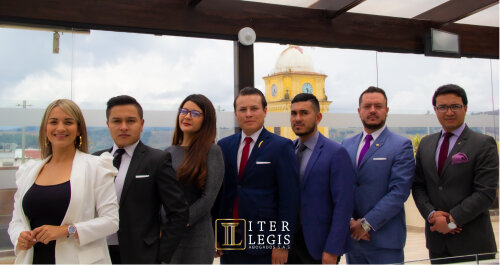Best Education Law Lawyers in Tunja
Share your needs with us, get contacted by law firms.
Free. Takes 2 min.
List of the best lawyers in Tunja, Colombia
About Education Law in Tunja, Colombia
Education Law in Tunja, Colombia, encompasses the set of national and local legal norms that regulate all aspects of the education system. These laws cover the rights and responsibilities of students, educators, educational institutions, and government entities. The aim is to ensure quality education, promote equity, and protect the welfare of all participants in educational environments. Tunja, as the capital of Boyacá, hosts several public and private educational institutions, making compliance with Education Law especially important for both individuals and organizations within the city.
Why You May Need a Lawyer
There are many situations where seeking legal advice or representation in Education Law is helpful or even necessary. You may need a lawyer if you encounter issues such as disputes over student enrollment or expulsion, facing disciplinary actions in a school or university, challenging the denial of special education services, experiencing discrimination or harassment within an educational institution, or requiring help with contracts or agreements involving educational entities. Lawyers can also assist teachers or staff dealing with employment issues, parents seeking to resolve educational grievances, or anyone navigating administrative processes in the education system.
Local Laws Overview
Education Law in Tunja follows Colombia’s national legal framework, primarily the General Education Law (Ley 115 de 1994), local ordinances and decrees, as well as policies set by educational authorities like the Secretaría de Educación de Boyacá. Important aspects include the right to free and compulsory basic education, inclusion of children and youth with disabilities, protection from discrimination and abuse, and regulations for both public and private institutions. Schools and universities must adhere to strict procedures regarding student admissions, disciplinary processes, and provision of educational resources. Additionally, teachers’ labor rights, academic freedoms, and institutional responsibilities are defined both locally and nationally.
Frequently Asked Questions
What are the main laws governing education in Tunja, Colombia?
The primary law is the General Education Law (Ley 115 de 1994), complemented by regional and municipal regulations specific to Boyacá and Tunja.
Can a school deny enrollment to my child?
Schools cannot deny enrollment based on discrimination factors. They can set academic or administrative requirements, but any denial must comply with national and local regulations regarding the right to education.
What rights do students have if they face bullying or harassment?
Students have the right to a safe educational environment. Complaints can be filed with the institution, and severe cases must be reported to local authorities or the Secretaría de Educación.
How can parents resolve disputes with schools?
Parents should first address concerns through the school’s established grievance process. If unresolved, complaints can be escalated to the Secretaría de Educación or pursued legally.
What is inclusive education and how is it protected by law?
Inclusive education ensures that all students, regardless of ability or background, receive appropriate support. Schools are legally required to provide necessary accommodations.
Are private institutions regulated differently from public ones?
Private institutions have more autonomy but are still bound by national education laws and regulations, especially regarding student rights and educational standards.
How are teachers’ rights protected?
Teachers are protected by labor laws, educational statutes, and collective agreements, ensuring fair treatment, safe working conditions, and due process in disciplinary matters.
What is the role of the Secretaría de Educación de Boyacá?
This local body oversees the implementation of educational policies, supervises institutions, and handles complaints or irregularities within the Boyacá region.
Can students appeal disciplinary actions such as suspension or expulsion?
Yes, students and parents have the right to review and appeal disciplinary actions through internal school processes or, if necessary, legal channels.
What steps should I take if my child’s educational rights are violated?
Document the situation, communicate with the school, and if needed, contact the Secretaría de Educación or obtain legal advice to protect your child’s rights.
Additional Resources
- Secretaría de Educación de Boyacá: The main governmental entity responsible for overseeing education in the region. - Defensoría del Pueblo: Provides support and advocacy in cases of rights violations, including in education. - Personería Municipal de Tunja: Works locally to defend citizens’ rights, including those related to education. - Local legal aid organizations and university legal clinics: Offer guidance or representation for those unable to afford private legal counsel.
Next Steps
If you require legal assistance in Education Law in Tunja, Colombia, begin by documenting every aspect of your concern or dispute. Engage in dialogue with the relevant educational institution and follow official grievance procedures. If your issue is not resolved internally, consider contacting the Secretaría de Educación de Boyacá or local authorities. Seeking advice from a qualified lawyer specialized in Education Law is recommended for more complex situations or when your legal rights are at risk. Legal professionals can guide you through procedures, represent your interests, and ensure your rights are protected throughout the process.
Lawzana helps you find the best lawyers and law firms in Tunja through a curated and pre-screened list of qualified legal professionals. Our platform offers rankings and detailed profiles of attorneys and law firms, allowing you to compare based on practice areas, including Education Law, experience, and client feedback.
Each profile includes a description of the firm's areas of practice, client reviews, team members and partners, year of establishment, spoken languages, office locations, contact information, social media presence, and any published articles or resources. Most firms on our platform speak English and are experienced in both local and international legal matters.
Get a quote from top-rated law firms in Tunja, Colombia — quickly, securely, and without unnecessary hassle.
Disclaimer:
The information provided on this page is for general informational purposes only and does not constitute legal advice. While we strive to ensure the accuracy and relevance of the content, legal information may change over time, and interpretations of the law can vary. You should always consult with a qualified legal professional for advice specific to your situation.
We disclaim all liability for actions taken or not taken based on the content of this page. If you believe any information is incorrect or outdated, please contact us, and we will review and update it where appropriate.









